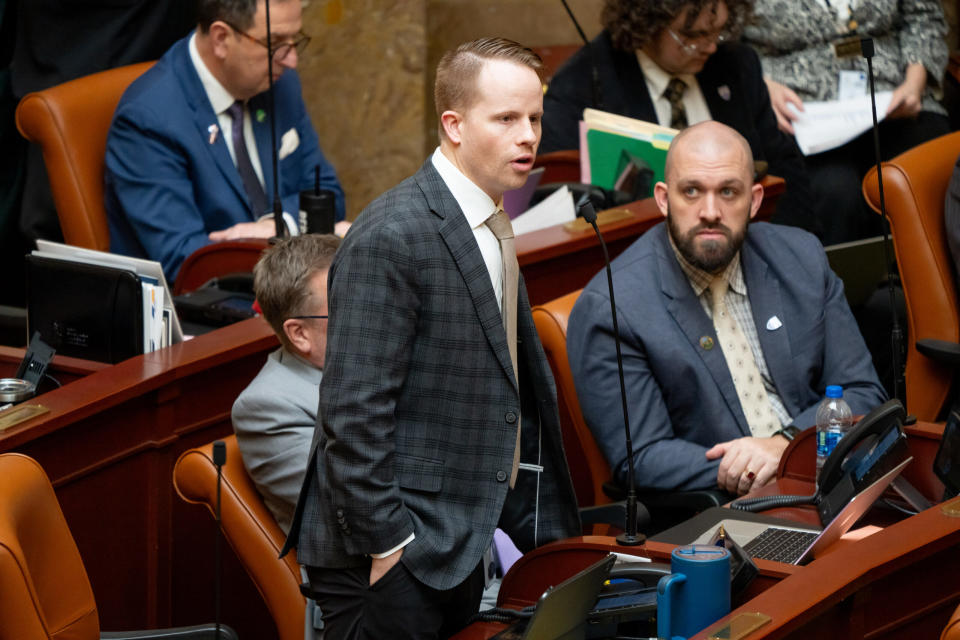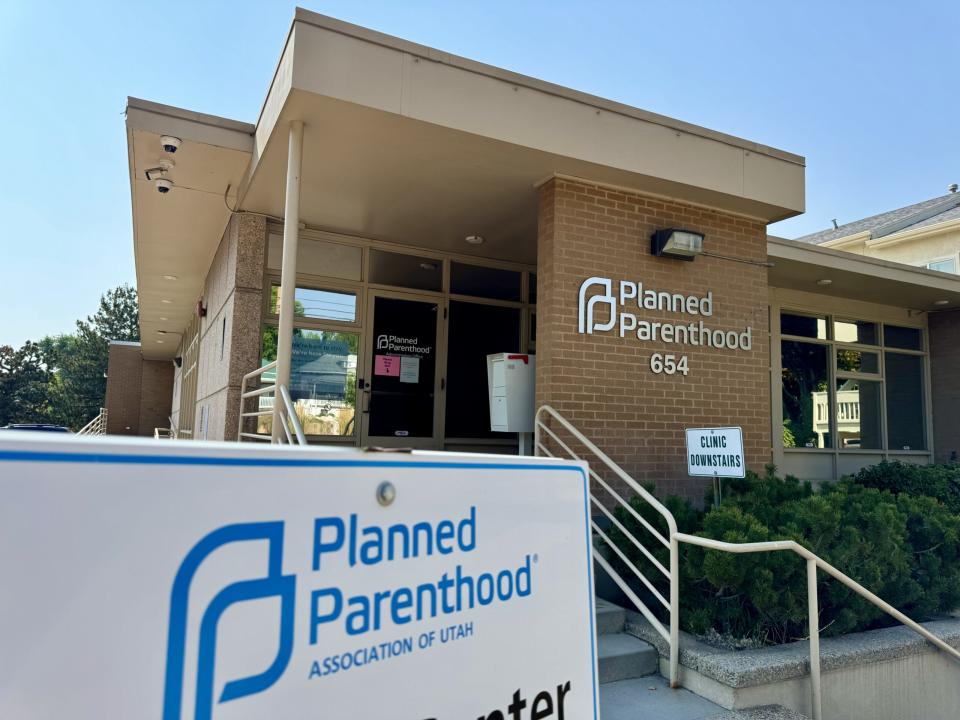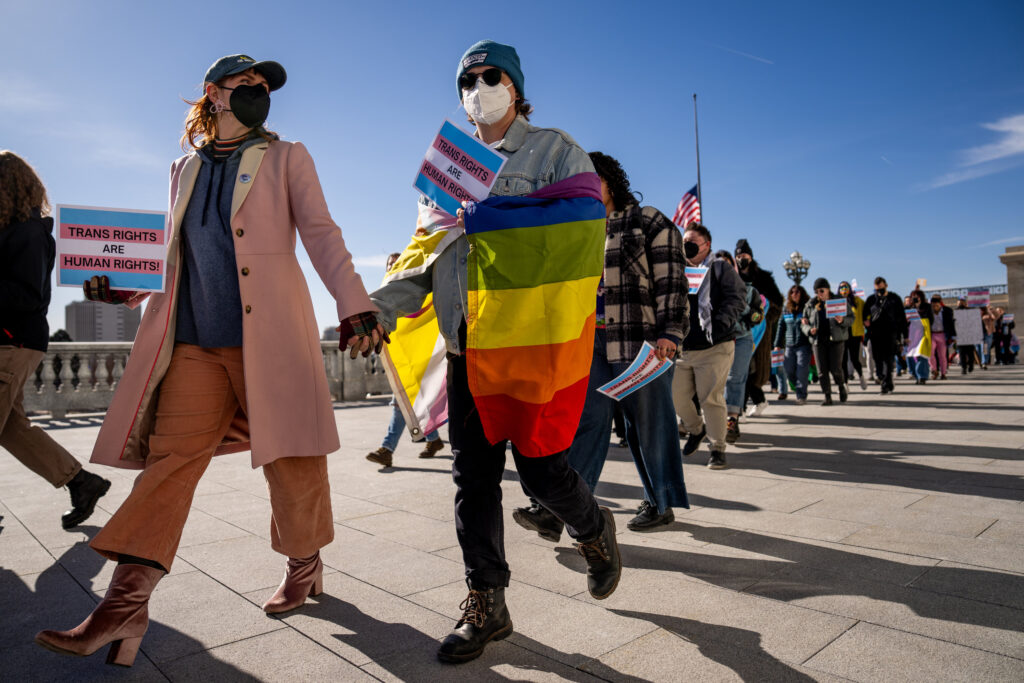Meagan Bertelsen and Shannon march hand-in-hand as people rally in support of transgender rights at the Capitol in Salt Lake City on the first day of the legislative session, Tuesday, Jan. 21, 2025. (Photo by Spenser Heaps for Utah News Dispatch)
Utah lawmakers advanced three bills Thursday seeking to regulate schools — but at least one bill, which was altered shortly before it was given an initial vote of approval, now reaches much further than just the classroom.
An original version of HB77, sponsored by Rep. Trevor Lee, R-Layton, would have focused on banning almost all flags from public schools, except for flags explicitly allowed in a prescriptive list included in the bill, such as the U.S. flag, the state flag, military flags, college or university flags, or others.
Pride flags or other LGBTQ+ flags — which Utah lawmakers in recent years have tried to prohibit from classrooms in various ways — would be prohibited.
But during the bill’s first public hearing Thursday in front of the House Education Committee, Lee successfully proposed a new version to extend that ban to all government buildings by prohibiting “a government entity or employee of a government entity from displaying a flag … in or on the grounds of government property.”
Those broader implications raised concerns that his bill would be unconstitutional. Still, despite the new, sweeping ban, Thursday’s debate focused mostly on its impact on teachers and students — including concerns that it would chill free speech and have an outsized impact on LGBTQ+ youth by making them feel unwelcome in their schools.
Nova Adstrum, of Sandy, listens during a House Education Committee hearing on a bill to ban Pride flags in Utah schools and government buildings at the Utah Capitol on Feb. 13, 2025. (Katie McKellar / Utah News Dispatch)
But Lee argued his bill is becoming “more and more needed as we are starting to see increasingly more hostile-type interactions between different political factions that we have within our society.”
“The education system in our schools should be a place for children to learn, to not feel like they’re being pushed or seen as agendas in one way or another as it pertains to political beliefs,” Lee said.
Lee said he wants to make clear that “flags that are political shall not be displayed within schools” with a goal of maintaining “political neutrality” in not just schools, but all “taxpayer-funded entities.”
However, Lee said there are instances where other flags may be allowed — including Nazi flags or Confederate flags, if they’re discussed as part of a history lesson.
“There are instances where in classrooms, you have a curriculum that is needed to use a flag, such as World War II, Civil War,” Lee said. “You may have a Nazi flag, you may have a Confederate flag. So you are allowed to display those flags for the purpose of those lesson plans. … And that is OK.”
Lee’s bill drew a large crowd to Thursday’s committee hearing. Supporters argued it’s needed to stop “propaganda” in schools while encouraging Utahns to “unite” under one flag — the U.S. flag. Those who opposed it argued Pride or LGBTQ+ flags aren’t “political” or trying to push an “agenda,” but rather they’re meant to signal to youth that they’re loved as they are.
Marina Lowe, policy director for Utah’s largest LGBTQ+ rights group, Equality Utah, said she initially was going to take a “neutral” position on an earlier version of Lee’s bill — until he changed it to expand the ban to all government entities.
“The government actually does have free speech rights, and this new language is likely unconstitutional, in violation of the First Amendment rights of governments to engage in free speech,” Lowe said.

Rep. Trevor Lee, R-Layton, speaks on the House floor at the Capitol in Salt Lake City on Thursday, Feb. 6, 2025. (Photo by Spenser Heaps for Utah News Dispatch)
Before Lee changed his bill, Lowe said that though Equality Utah believes “that all flags — Pride flags in particular — are meaningful symbols of inclusion,” the group also acknowledges “that the true measure in a welcoming classroom isn’t found in symbols displayed on the walls, but in the policies and practices that ensure all students in Utah schools receive an education free from discrimination.”
Lowe said Equality Utah intends to keep working with Lee to negotiate changes to his bill as it progresses through the rest of the Legislature.
Several Utahns spoke in favor of Lee’s bill, supporting efforts targeted at banning Pride flags. They included Aaron Bullen, from Lehi, a father of a 10-year-old son who he said came home from school one day “upset” because “a large Pride flag was placed in his computer lab.” Bullen said his principal agreed to have the flag removed, but “not all parents are as fortunate.”
“We all know that if a teacher hung up a flag with a giant picture of Jesus on it, it would be removed immediately — and rightfully so,” Bullen said. “Public schools should not endorse any political, religious, or ideological symbols. Yet the progress flag sends a clear message about marriage. It also sends a message about gender, that a boy can become a girl, and a girl can become a boy. This message conflicts with my family’s religious beliefs.”
Jennifer Rowley, from Davis County, who said her daughter “has a family that has two moms,” said she’s not only concerned as a parent, but also as a medical provider. She said LGBTQ+ Utahns — including herself — have struggled with suicide due to “homophobia,” and that the presence of a Pride flag helps people feel welcome, not excluded or invisible.
SUBSCRIBE: GET THE MORNING HEADLINES DELIVERED TO YOUR INBOX
“The Pride flag is not a political flag,” she said. “It’s not an agenda. It’s a symbol of safety, inclusivity and love. It’s a symbol that shows our kids and community that they matter, they are seen, and they are loved. It allows a safe space to reach out to someone who’s accepting and safe to open up to. It simply saves lives.”
The House Education committee voted 11-2 to advance HB77 to the House floor, with the committee’s only two Democrats — Reps. Sahara Hayes, D-Millcreek, and Carol Moss, D-Salt Lake City, voting against.
Shielding teachers who misgender students
Soon after, the same committee also advanced another bill that LGBTQ+ people and advocates viewed as a direct attack against transgender people.
With HB250, Rep. Nicholeen Peck, R-Tooele, wants to ban school districts or other education leaders from disciplining a teacher who doesn’t use transgender students’ preferred names or pronouns if they don’t match their school records.
Peck presented that bill alongside her predecessor, former Republican Rep. Tim Jimenez, who did not seek reelection. Before becoming a lawmaker this year, Peck would regularly advocate on Capitol Hill for religious freedom and parental rights.
Last year, Jimenez unsuccessfully tried to run similar legislation, but now Peck is picking up that torch. Jimenez’s brother, Carlos Jimenez, a junior high health teacher in Tooele, spoke in favor of the bill, saying he’s not sure how to navigate “hard situations” when he’s doesn’t know what pronoun to use for a student.
“Really, the focus is on the protection of the teachers who are doing their very best,” Peck said. “I have no doubt that everyone is trying to respect everyone the best they can, but sometimes they make mistakes. And so they need to have some protection. There are teachers that are nervous about this.”
Tim Jimenez said a “surprising number” of teachers who “really did fear if they misgendered someone they were going to lose their job — retaliatory action for basically just having a belief system or practicing their freedom of speech.”
But Hayes — Utah’s only openly LGBTQ+ lawmaker — pointed out that Utah law already protects discriminatory actions based on religious belief under a well-known 2015 law called “The Utah Compromise.”
“I’m curious what the specific need is for (this bill) when there’s already language that we have in our statute that protects this,” Hayes said.
Peck said in 2015 Utah lawmakers didn’t contemplate “this new gender trend — craze — that has happened, where a lot of young people are experimenting with gender and stuff like that.”
Lowe also spoke against the bill, saying it’s “unnecessary, seemingly targets the trans community, and … is duplicative. It’s already captured in existing Utah code.” Like Hayes, Lowe said the “Utah Compromise” already contains provisions that make it clear employers can’t take actions against employees because of their beliefs.
Regardless, the House committee voted 12-1 to advance the bill to the House.
Banning Planned Parenthood educators from schools
Another bill sponsored by Peck also won endorsement from the House Education Committee despite pushback from critics saying it could jeopardize health and sex education.
With HB233, Peck wants to ban “entities that perform elective abortions” — like Planned Parenthood — from providing “health related instruction or materials in public schools.”
Peck said she decided to pursue the bill after she said she discovered an “elective abortion provider” handed out pamphlets at a school that she alleged promoted “sexual activity” and violated state law.

A Planned Parenthood clinic in Salt Lake City is pictured on Wednesday, July 31, 2024. (McKenzie Romero/Utah News Dispatch)
But rather than on focusing on that alleged violation, Peck wants to ban Planned Parenthood educators completely from Utah’s public school system.
For more than five decades, Planned Parenthood educators have offered “age-appropriate health education, such as maturation, sexually transmitted infections, and healthy relationships, in Utah schools,” according to the Planned Parenthood Association of Utah. “PPAU’s skilled educators follow all state laws and guidelines and only teach curriculum that has been approved by parents, teachers, and the district school board. Parents must opt-in and sign a permission form for their child to participate in these classes.”
Peck and her supporters, however, argued that Planned Parenthood educators shouldn’t be allowed to teach Utah children, alleging its part of a “business model” to encourage future clients.
Danielle Cypers, legislative liaison for Pro-Life Utah, argued there’s “plenty of other curricula” Utah schools could use in place of Planned Parenthood’s “that are not special interest groups whose pockets are lined by our students’ sexual decisions.”
“We cannot afford to give abortion providers that kind of leverage over our children,” Cypers said.
Let us know what you think…
Brittany Breneman, education director at Planned Parenthood Association of Utah, urged lawmakers not to support the bill, saying it will negatively impact Utahns. She said Planned Parenthood’s curriculum is “abstinence based,” it’s free, and parents must already opt in to the courses, which are approved by local school boards.
“Why does Planned Parenthood provide health education in public schools? It’s because we want to support a space (where) students can learn medically-accurate, age-appropriate information about their bodies all while following state guidelines,” Breneman said.
Moss, a Democrat, spoke against the bill, saying the debate has been “dismaying to me because the things that were said are not happening.”
“I don’t know how many times you can say Planned Parenthood volunteers are teaching the curriculum that has been established by … our state Board of Education,” Moss said. “That’s exactly what they’re teaching in schools. Nothing more, nothing less. .. They’re not advocating for elective abortions.”
House Majority Whip Karianne Lisonbee, R-Clearfield, who has run anti-abortion legislation, pushed back on Moss, saying she’s seen “some of the literature that they are distributing in our schools and it is completely out of compliance with state law and not appropriate.”
The House committee voted to advance HB233 on a 12-2 vote. It now goes to the full House.
SUPPORT: YOU MAKE OUR WORK POSSIBLE
Read the full article here
